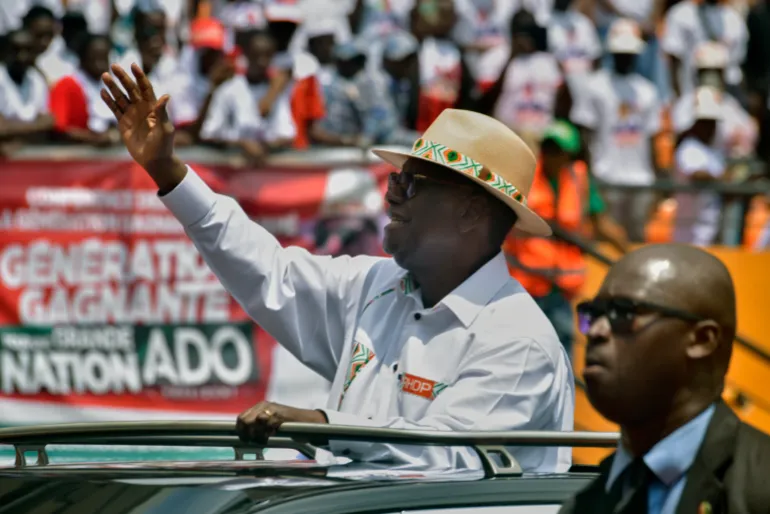Voters in Ivory Coast go to the polls on Saturday for a presidential election that is expected to extend the rule of Alassane Ouattara, the country’s longtime president.
Mr. Ouattara, 83, is accused of using his authority as president to have the electoral commission bar his main opponents as he seeks a fourth term. He has already spent 15 years in power, having carried out changes to the constitution in 2016, which reset term limits.
Voters in the world’s largest producer of cocoa beans now face a choice between renewal and continuity, observers say. Mr. Ouattara has been praised for delivering political stability and economic progress. But critics say he has unleashed a crackdown on dissent.
Ivory Coast has seen a major political and economic turnaround in the last decade. After emerging from civil war and a violent, post-election uprising in 2010, the country has avoided the large-scale unrest and insurgencies seen in neighboring countries in the Sahel.
“Ivorians want peace,” said Abou Bamba, an adviser to Mr. Ouattara. “We’re seeing what is happening in countries like Mali and Burkina. We don’t want that and we also don’t want to go back to war.”
Under Mr. Ouattara, Ivory Coast has seen large-scale infrastructure development and an economic boom that has sharply reduced poverty. Ivorians now earn about $2,709 on average every year — the second highest amount in West Africa, after Cape Verde. Despite the country’s achievements, there is growing resentment over Mr. Ouattara’s long stay in power.
The run-up to the election has been clouded by opposition claims that the ruling party has manipulated the vote by barring candidates. Mr. Ouattara’s office has dismissed those allegations and said opposition parties remain active.
Tidjane Thiam, 63, who is seen as Mr. Ouattara’s main challenger, was declared ineligible by the constitutional council because he holds French citizenship. Mr. Thiam was the chief executive officer of Credit Suisse and the group chief executive officer of Prudential until 2015.
Laurent Gbagbo, 80, who led the country from 2000 to 2011, was hoping to run in the election after his acquittal by the International Criminal Court on war crimes charges over the post-election crisis that killed more than 3,000 people. He returned to Ivory Coast in 2021 after 10 years in The Hague, but was disqualified last month from running in the election by the electoral commission because of an earlier conviction in a separate legal proceeding.
With Mr. Gbagbo and Mr. Thiam out of the race, the opposition is left with weaker candidates, said Beverly Ochieng, a senior associate at the Center for Strategic and International Studies. One is a former first lady, Simone Gbagbo, who is trying to mobilize the electoral base of her ex-husband, Mr. Gbagbo.
Jean-Louis Billon, 60, a former minister and one of the country’s wealthiest people, was passed over by the main opposition party for Mr. Thiam. Mr. Billon is counting on winning the votes of
Many observers say this year’s election appears far less tense than previous ones, but pockets of unrest have emerged, highlighted by major anti-government protests earlier this year. In the commercial capital, Abidjan, more than 200 opposition supporters were arrested this month. Two people — a protester and a policeman — were killed, and the offices of the electoral commission were set on fire.
High youth unemployment and lingering animosity from the post-election crisis that paved the way for Mr. Ouattara’s presidency have also ignited protests.
Ahead of the election, there has also been a surge in disinformation campaigns that experts say are similar to those that preceded coups in the Sahel. One viral post in May falsely asserted there had been a coup in Ivory Coast. Another portrayed Mr. Ouattara as a puppet of France, the country’s former colonial ruler.
“Because Ouattara has been associated very closely with Cote d’Ivoire’s postwar reconstruction, with the economic boom, he’ll likely be re-elected based on those credentials,” said Ms. Ochieng. “This doesn’t discount the fact that there are questions about his legitimacy.”
The voting is scheduled to begin at 8 a.m. and close at 6 p.m. Provisional results are expected to be announced by the electoral commission within five days, but this is typically done 48 to 72 hours after the vote. The final results will be announced by the Constitutional Court within two weeks.
If no candidate wins more than 50 percent of the votes, the top two candidates will face each other in a runoff. An estimated 8.7 million citizens are eligible to vote in Ivory Coast.
Analysts say a runoff is unlikely and that Mr. Ouattara is expected to win.
Saikou Jammeh is a reporter and researcher for The Times based in Dakar, Senegal.
